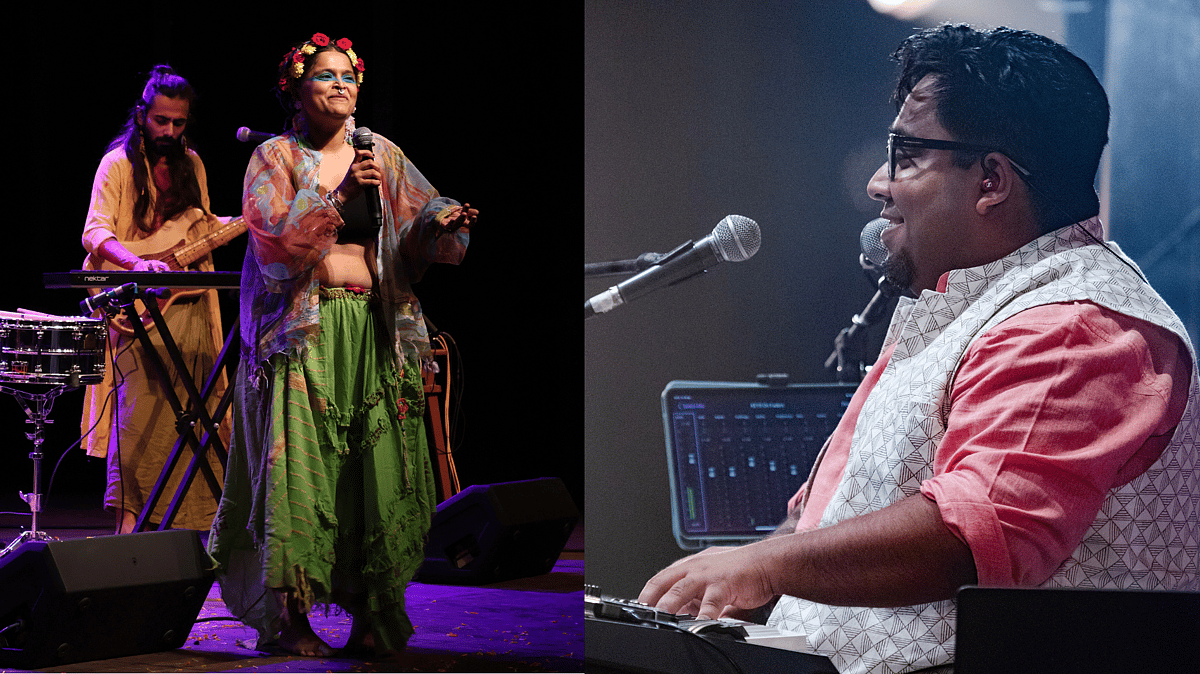One band is from Surat, the other from New Delhi. One incorporates Indian folk into its eclectic sound, the other blends classical ragas with contemporary arrangements. One has four members, the other has four times the size. One released a new song, the other launched its latest album.
Though The Tapi Project and Anirudh Varma Collective (AVC) are structurally and sonically different, they both seamlessly blend traditional and modern music to create some great melodies and provide a fabulous concert experience. Mumbai audiences were lucky to see them at different venues. While the Tapi Project performed at the Royal Opera House in South Mumbai, Delhi’s AVC played at the Studio auditorium of the Nita Mukesh Ambani Cultural Centre (NMACC) in Bandra Kurla Complex.
Both gigs were top-notch. Let’s do a recap. The Tapi Project from Surat featured the fabulous vocalist Swati Minaxi, who also chipped in with trumpet on some numbers. She was accompanied by guitarist and songwriter Yogendra Saniyawala, keyboardist Biju Nambiar and drummer Gaurav Kapadia. Their songs are in Hindi, though they also sang in Gujarati on last year’s release Varsaad.
That song was one of the highlights, though they had to tweak it as the original also featured Kannada vocals by Raghu Dixit. Though Swati had hurt her foot, she performed with her usual energy, dancing along on numbers like Mehsoos, Haiya Ho and Suburban Zindagi. The set included two songs using lines by poet-saint Kabir – Aye Khuda and Udd Jaayega Hans Akela, the latter being considerably different from the one popularised by legendary classical vocalist Kumar Gandharva. And there was the still-to-be-released Firdaus, which quoted Amir Khusro and had a stunning climax.
The new song, Aa Gaye, was described by Yogendra as radio-friendly, as it is just two minutes and 36 seconds long. It is also a contrast to the other songs, as it has a soothing ballad-like melody, with Swati singing, “Aaj phir bin bulaaye saamne aa gaye, aa gaye, aa gaye, woh”. Though the group used many folk elements, Yogendra said they were just playing music without sticking to any specific genre. After the show, one heard industry professional Shatadru Sarkar describe them as ‘acid folk’. The name seemed perfect.
At the AVC show, one heard someone use the term ‘neo-classical magic’. Those familiar with their earlier repertoire have relished their presentation of Hindustani raags Tilak Kamod, Bhimpalasi, Chhayanat, Jaijaiwanti, Shankara, Bihag and the Carnatic Saraswati and Vasanthi, incorporating modern arrangements. They don’t compromise on the purity of the compositions, and yet have that flavour that could attract more modern tastes.
The latest show was held to mark the launch of the collective’s third album Sabr, released a month ago. The group is led by keyboardist and producer Anirudh, and the instrumentalists accompanying him were Rohan Prasanna on sarod, Soumitra Thakur on sitar, Rohit Prasanna on bansuri, Shrikant BIswakarma on electric guitar, Madhur Chaudhury on bass, Suyash Gabriel on drums and Saptak Sharma on tabla. The vocals were shuffled between the marvellous Prateek Narsimha, Saptak Chatterjee, Aastha Mandle, Pavithra Chari, Basudhara Roy Munshi and Suhavi Kalsi. Some of the other members weren’t part of this show.
The collective blends textures smoothly, using different vocal styles for varied expression. It has the soul of classical music and virtuosity in arrangements. The concert began with songs from the new album, with Saade Naal and Gavati setting the mood and Mausam providing variety with is romantic nature. Aastha then rendered the uplifting Kabir song Nirgun Nirbhaya, once popularised by Kumar Gandharva. Three other Kabir works – Pavithra’s Saadho, Moko Kahaan Dhoonde and Ghat Ghat Mein Panchi Bolta – lent a spiritual flavour. The number Naseeba featured the recorded voice of Kavya Singh, a prominent and hugely talented member who passed away last year.
Bands like The Tapi Project and AVC act as an ideal bridge in attracting youngsters to the roots. And yet, their music appeals to the older generation too. Therein lies their charm.
